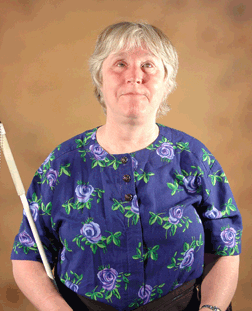
The Braille Monitor November 2005
The Deposit Box
by Seville Allen
 |
|
Seville
Allen |
From the Editor:
Seville Allen is a longtime leader of the National Federation of the Blind.
She currently serves as first vice president of the NFB of Virginia. In her
cover note transmitting this little article to me, Seville said that she had
been thinking about this subject for some months, so she wrote down her reflections.
She has made me think as well. Perhaps this Thanksgiving all of us in the Federation
should think about the blessings that previous generations have deposited for
us to draw on and then consider how much we are doing for the generations to
come. This is what she says:
It was April 21, 2005, a beautiful spring day in Arlington, Virginia. I grabbed
my purse and cane, locked the house door, and began the three-block walk to
my bank. My purpose was to retrieve my passport from my deposit box as part
of my preparation for a trip to Italy. I arrived at the bank, advised the bank
officer that I needed to get into my deposit box, produced my box key, and we
entered the vault. The bank officer turned a key in one lock, and I used my
key in another. I heard the sound of metal on metal as the bank officer lifted
my box from the drawer, placed it on a table, and left the room. I found myself
alone in the vault accessing my deposit box with complete privacy.
My passport retrieved, I walked the three blocks home. As I waited for the light to change at a busy intersection, my mind wandered back to the late 1970's. The memory was so vivid that it was hard to believe it was twenty-five years ago that Marion McDonald, one of the founders of the NFB of Virginia, couldn't have retrieved anything from a deposit box because she had been denied one on the basis of her blindness. How different her experience was from my own!
I recalled that during a NFB chapter meeting all those years ago Marion had explained to the members that she had been denied a deposit box at the bank. She had gone to the bank to rent a box to have a safe place to keep our affiliate financial records. The bank officer told her that the bank could not be responsible for anything taken from her box, and when she explained that she would be keeping track of the box contents, the bank officer said that someone might come into the vault and take something without her knowledge because she wouldn't see it happening. "How could that be?" I thought as Marion continued her story. I had learned this positive reaction and also my indignation from Marion and my chapter colleagues.
Marion McDonald was one
of the most competent people I have ever known. She was one of my first positive
role models of what a blind person could do. She was our treasurer, taught kids
piano lessons, and was a wise, gentle, and competent adult making her way in
Alexandria. She had taught at a prison, so why would she let anyone come into
a bank vault and take something of hers? Surely Marion would hear footsteps
and recognize the sound of paper being moved--these were my thoughts as Marion
told her sad story.
But Marion's story ended with her telling us that no one in the bank would let
her have the box despite her explanations and arguments to the contrary. The
bank official's ignorance prevailed, and Marion could not have a deposit box
even if she paid for it.
Now, in 2005, all that has changed. As I walked down my quiet street, approaching my home, I thought of how pleased Marion's spirit would be to know that another layer of discrimination had been removed, giving my generation access to something her generation, and Marion particularly, never got to enjoy. I thought about how much Marion had taught me, especially that blindness in itself isn't the issue, but society's attitudes about it. These constitute discrimination and make the absence of vision for many of us more a social handicap than a physical disability. As I thought about Marion's experience, it occurred to me that our work to change what it means to be blind is a big deposit box--a box constructed from our positive approach to blindness. Our deposit box keys consist of hard-won legislation, improved rehabilitation regulations, our Kernel Books, and our Jernigan Institute. Our collective experiences represent the contents of the box. Each generation of Federationists makes deposits in the box, deposits that can be retrieved by the next generation.
Marion's teaching me that blindness need not be a barrier to functioning as a responsible adult was the deposit slip marked "confidence" that Marion placed in the box for me to retrieve: to go to the bank and get a deposit box rather than assume that, because I am blind, the bank would deny my application. That bank deposit box containing my valuable papers is only a symbol of the contents of the deposit box our NFB offers each of us to learn how to be a part of changing what it means to be blind for ourselves, bank officials, and society at large. These accumulated experiences are the essence of changing what it means to be blind.